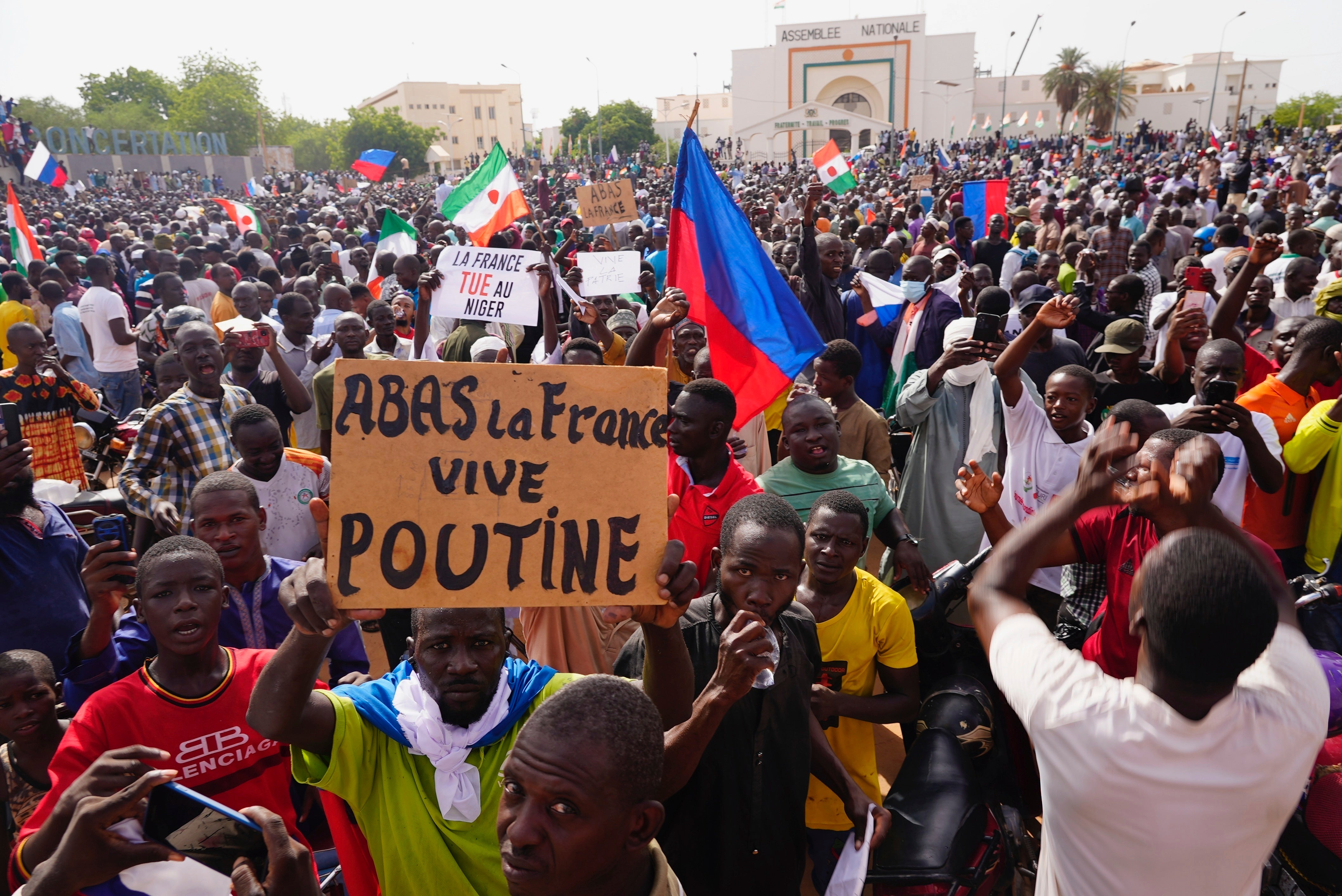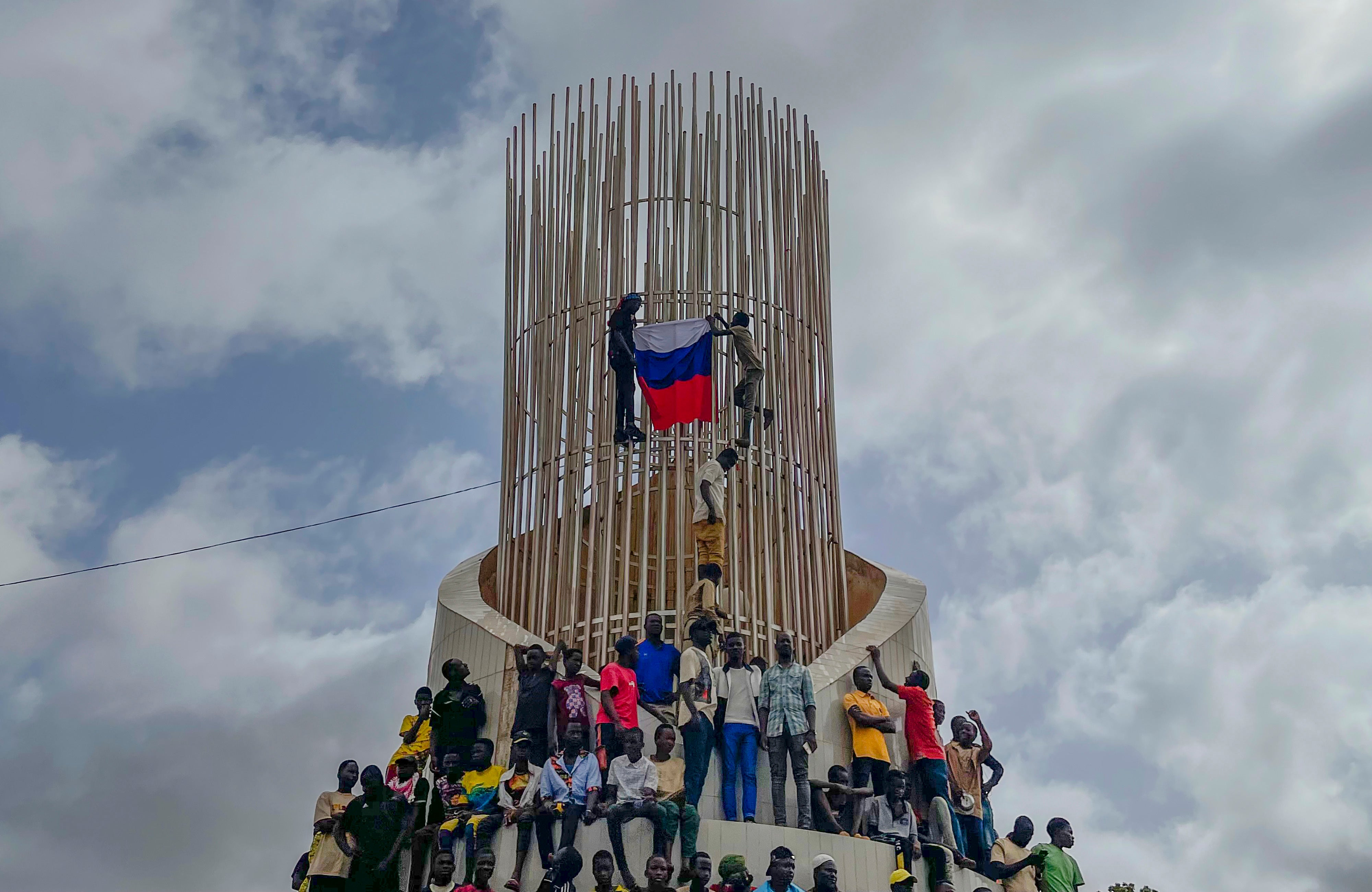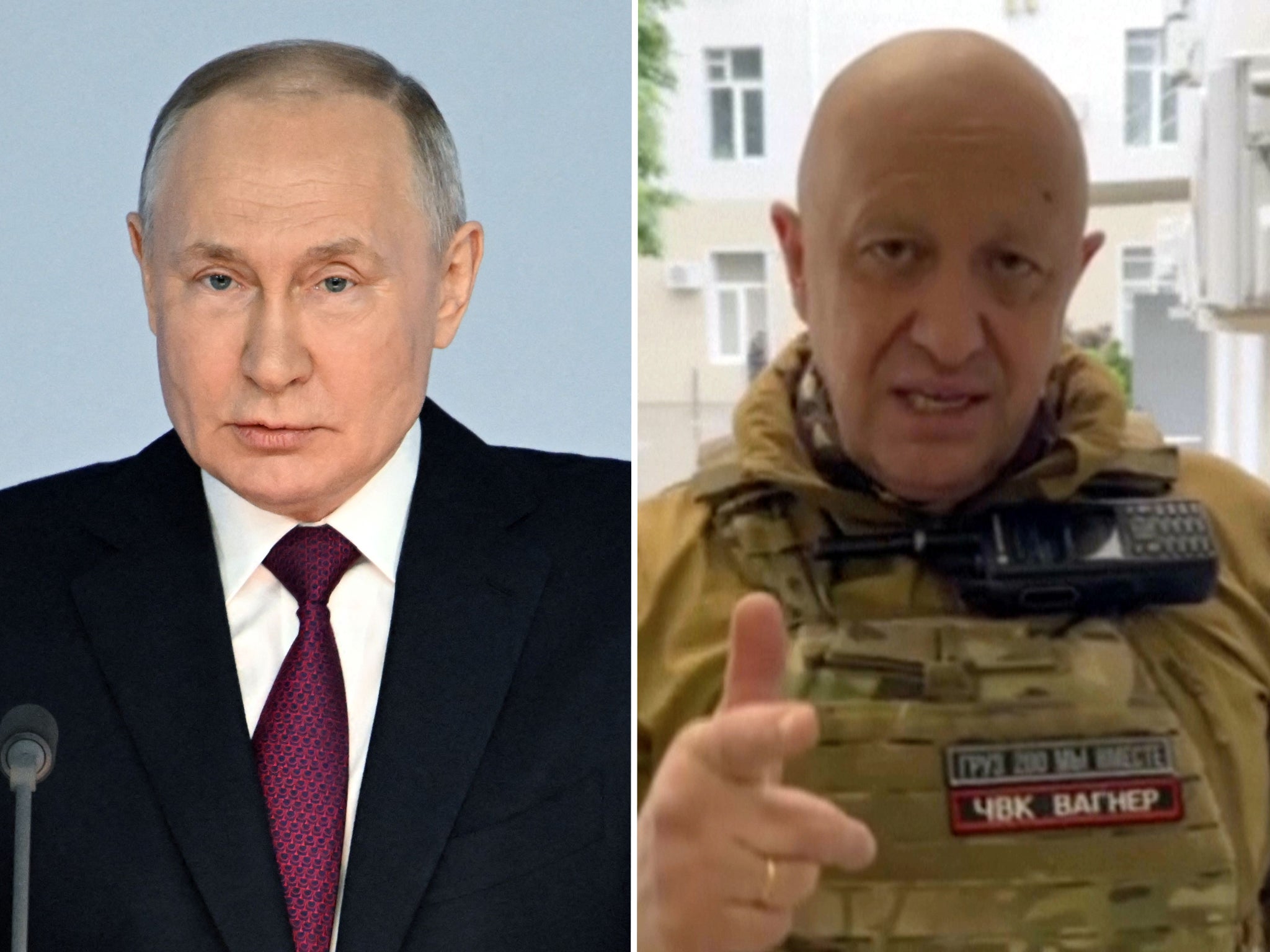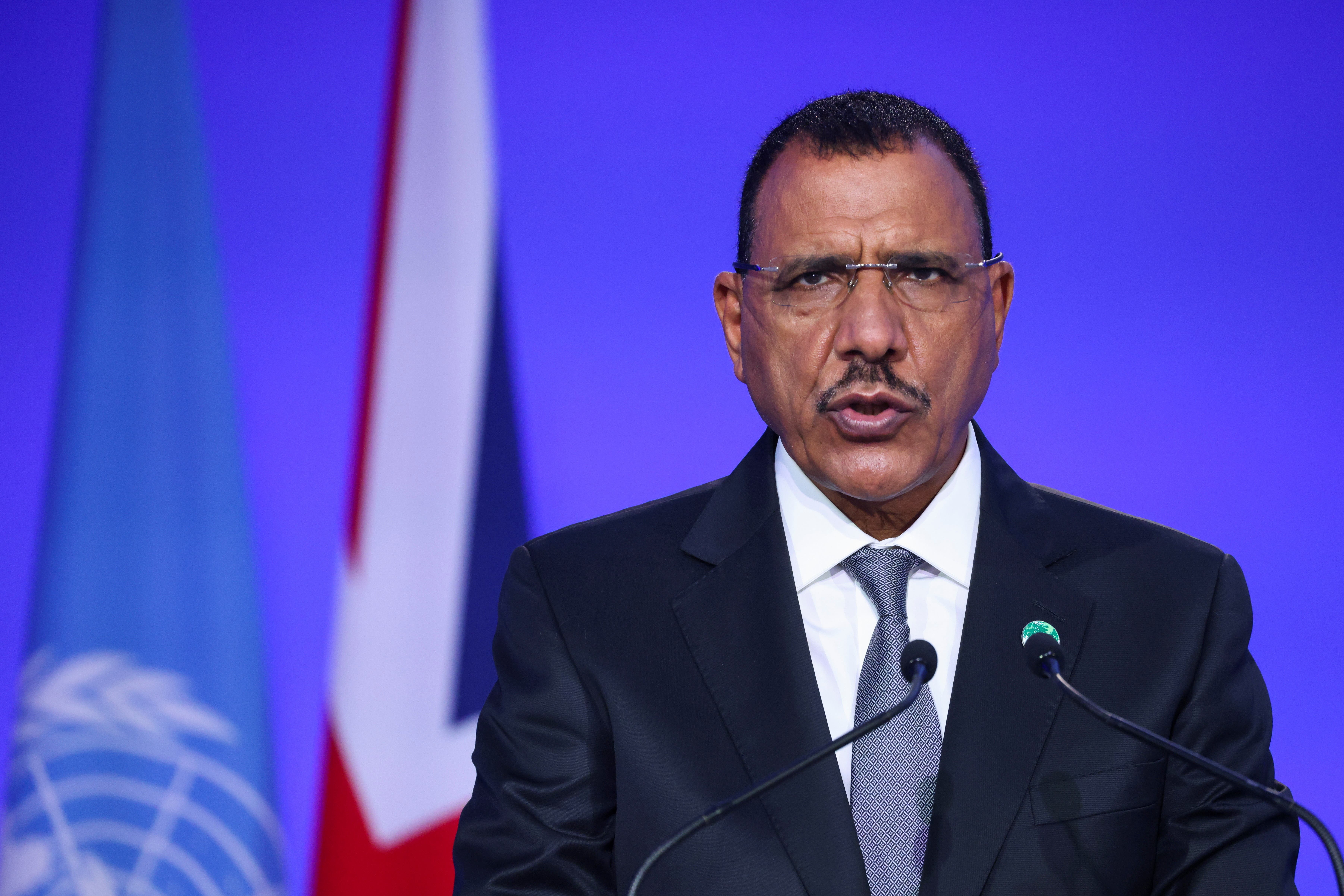As fighting rages in Ukraine, a shadow war is brewing between Russia and the West in Africa
With a military coup in Niger – a key Western ally – Russia’s Vladimir Putin and the Wagner mercenary group will be seeking to extend their influence in the Sahel region, writes Kim Sengupta


As the brutal combat of the Ukraine war grinds on – with a rising toll of death and destruction – the threat is growing of a shadow conflict between Russia and the West erupting 2,500 miles away in Africa.
The coup in Niger, overthrowing the elected president Mohamed Bazoum, a key Western ally, brought a military junta into power. The country joins three neighbouring states ruled by army strongmen, which all have extensive connections with the Wagner mercenary group.
The crisis is escalating by the day. The 15-nation regional bloc – the Economic Community of West African States (Ecowas) – has stepped up its warning of military intervention, demanding that Bazoum is returned to power and the mutinous troops withdraw to their barracks.
Bazoum has appealed directly to the US for help. Describing himself as "a hostage”, the deposed leader has stressed that the whole of the Sahel region will fall further under Russian influence, with the West being sidelined, if the illegal seizure of power in his country is allowed to stand.
Addressing the situation publicly for the first time, US president Joe Biden has demanded that the Nigerien president be freed immediately, saying: “In this critical moment, the United States stands with the people of Niger to honour our decades-long partnership rooted in shared democratic values and support for civilian-led governance.”
Bazoum has been trying to foster strong relations with the West, including the UK. He was one of few non-Commonwealth African heads of state present in London for King Charles III’s coronation in May. He told me in an interview at the time how, in a region beset by jihadis, Wagner mercenaries and unstable military regimes, his country has become a linchpin for the West.
“We are fully aware of the dangers in our region: there are regular attempts to destabilise our government and society. With the help of our Western partners, with investment and education, I am sure we can preserve democracy in our country – but the threat is always there, from the extremists and Wagner,” he pointed out.

In the wake of the coup, the British foreign secretary, James Cleverly, held a meeting with Nigerian president Bola Tinubu in Lagos, after which he said: “The UK very much welcomes Ecowas’s actions, and they are indeed decisive actions with a strong commitment to democracy.”
The British military has training and advisory teams in Nigeria, helping to support operations against the Islamist organisation Boko Haram. A force deployed alongside the French in Mali was withdrawn last November. Defence sources say there are no plans at present to use UK armed forces on a mission in Niger.
On Thursday, the leaders of the Nigerien coup cancelled a military cooperation agreement with France, which involves around 1,500 troops being in Niger to counter Islamist insurgency in the region. Some of those troops were moved there from Mali and Burkina Faso after they were replaced by Wagner forces when the military regime came into power in the two countries.
The US, too, has a strong military presence in Niger, with around 1,200 troops and a drone base that cost $100m (£78m) to build. The soldiers have been restricted to their base in the northern city of Agadir since the putsch. The US, along with France, the UK and other Western countries, has carried out a partial evacuation of its embassy staff and nationals from Niger. The Pentagon says it has no immediate plans to pull out American troops for the time being.
Demonstrators waved Russian flags and burned French ones as they attempted to set fire to the French embassy in the Nigerien capital, Niamey, while calling for help from Moscow in the aftermath of the coup.

Wagner founder Yevgeny Prigozhin, who seems for the time being to have survived the fallout from his group’s own attempted coup against Vladimir Putin, has accused the Western “former colonisers” of orchestrating a security crisis in Niger and other countries that were once colonies. This, he said, has created a “love for Wagner” because “thousands of Wagner fighters are capable of bringing order and of destroying terrorists, and of not allowing them to harm the local populations of these states”.
Prigozhin, who was thought to have been exiled to Belarus under terms brokered with the Kremlin by the country’s president Alexander Lukashenko in an effort to end the Wagner mutiny, turned up at a Russia-Africa summit in St Petersburg a week ago. It appears to be business as usual for the company’s lucrative operations in Africa, backed by Moscow.
At the summit, the leaders of the military regimes in Burkina Faso and Mali declared that they would view any foreign armed action against Niger as an attack against them.
“Any military intervention against Niger would be tantamount to a declaration of war against Burkina Faso and Mali,” they said in a statement. The head of the Guinea regime, Mamady Doumbouya, warned that “military intervention would lead to a humanitarian disaster whose consequences could extend beyond the borders of Niger”.

Meanwhile, street disturbances have broken out in Senegal, where the government has put its armed forces at the disposal of Ecowas, if needed, for a Nigerien mission. The protests have been primarily about the arrest of opposition leader Ousmane Souko, but officials claim they are being whipped up by disinformation, with the involvement of foreign organisations.
Western officials point to similar campaigns against other governments in the Sahel. A fake social media post claimed that Bazoum had faced a coup while visiting Emmanuel Macron in Paris; another that the French had armed a group of jihadis who killed 17 members of Niger’s armed forces at around the same time. Both of these posts have been traced to the Lakhta project, a troll farm financed by Prigozhin, which has been sanctioned by the US since 2018.
General Abdourahmane Tchiani, the head of the new Nigerien regime, has been in a defiant mood, saying that “foreign meddling and intervention” would unite “the people of Niger as a whole to defeat all those who want to inflict unspeakable suffering on our hard-working populations and destabilise our country”.
Western security officials say there is a strong feeling that action needs to be taken.
“We are back to the days of the Cold War and the domino theory. We have seen how so many of the pieces have fallen to the Russians, with little being done to combat these military coups,” said one official. “There is a lot of support for Niger being the place where this is reversed. The measures on the ground will be left to Ecowas, but they will have strong American and European support.”
That mood was being echoed in neighbouring states. In Senegal, foreign minister Aissata Tall Sall said: “We have had one coup too many in this region ... Senegal’s conviction is that these coups must be stopped.” If Ecowas intervenes, she said, “Senegalese troops will go there.”
Following an Ecowas defence meeting, the Nigerian military’s chief of staff, General Christopher Musa, said: “Restoring democracy in Niger will not be an easy task, but we are ready, and as soon as we receive the order to intervene, we will do so.”






Join our commenting forum
Join thought-provoking conversations, follow other Independent readers and see their replies
Comments